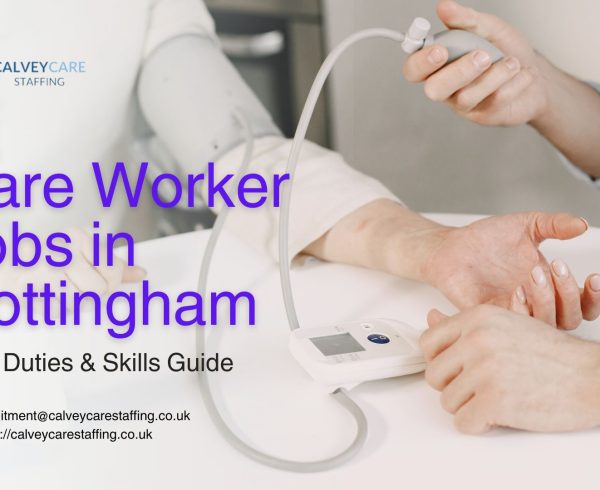The healthcare industry is one of the most dynamic and rewarding sectors in the world. From doctors to nurses, each role carries vital responsibilities that contribute to patient care, safety, and overall well-being. Understanding healthcare jobs is essential for anyone considering a career in this field or seeking to enhance their professional development.
This blog explores the key responsibilities that define them, and the skills professionals need to excel in a sector built on compassion, precision, and continuous learning.
The Core Purpose of Healthcare Roles
At the heart of every healthcare position lies a shared purpose to promote health, prevent illness, provide care, and improve patients’ quality of life. While responsibilities vary across specialisations, all healthcare professionals contribute to delivering effective and ethical care. Whether they work in a hospital, community clinic, research lab, or home-care setting, their duties balance technical skill, empathy, and collaboration.
Healthcare jobs’ responsibilities can broadly be grouped into three categories:
- Clinical responsibilities: Direct patient care, including diagnosis, treatment, and monitoring.
- Administrative responsibilities: Record keeping, coordination, compliance, and operational support.
- Supportive responsibilities: Assisting medical staff, managing equipment, or providing emotional support to patients and families.
Key Responsibilities of Healthcare Roles
Healthcare job responsibilities encompass a wide range of duties aimed at providing effective, safe, and compassionate patient care, as well as supporting healthcare operations. These responsibilities can vary depending on the specific role, level of seniority, and healthcare setting, but generally include the following key tasks:
Patient Care and Support
- Helping patients with personal hygiene activities and daily tasks.
- Administering medications and monitoring vital signs such as blood pressure, pulse, and temperature.
- Assisting with medical procedures and tests, including blood draws, specimen collection, and medical examinations.
- Providing emotional and psychological support to patients and their families.
Medical and Clinical Duties
- Conducting routine assessments and diagnostic tests.
- Preparing and maintaining patient documentation, medical records, and correspondence.
- Operating and maintaining medical equipment.
- Assisting healthcare professionals, including nurses, doctors, therapists, and technicians, in delivering specialised care.
Administrative Responsibilities
- Scheduling appointments and managing patient flow.
- Ordering supplies and maintaining inventory of medical materials.
- Ensuring compliance with health and safety regulations, confidentiality laws, and hospital policies.
Education and Health Promotion
- Educating patients and their families about managing health conditions and promoting healthy lifestyles.
- Providing support for health campaigns and public health initiatives.
Collaboration and Communication
- Collaborating with multidisciplinary teams to develop and implement treatment plans.
- Communicating effectively with patients, families, and other healthcare team members to ensure coordinated care.
Additional Responsibilities
- Visiting patients at home for ongoing care and support.
- Participating in team meetings and continuous professional development activities.
Specific Role Variations
Support workers, nurses, and technicians have roles that focus more on assisting with daily living activities, clinical procedures, or operational tasks, depending on their scope of practice.
Overall, healthcare professionals are tasked with ensuring high-quality care, promoting patient safety, supporting recovery, and collaborating efficiently within healthcare teams to improve patient outcomes.
Skills Needed to Fulfil Healthcare Jobs Responsibilities
While each healthcare role has unique duties, there are several core skills that professionals across the industry share:
- Communication skills: Effective listening and clear communication with patients and colleagues are vital for understanding needs and delivering appropriate care.
- Empathy and compassion: Healthcare is as much about understanding emotions as it is about treating conditions.
- Attention to detail: Accuracy in record-keeping, medication administration, and patient data prevents errors and ensures safety.
- Adaptability: Healthcare environments are unpredictable, and professionals must adapt quickly to new information, emergencies, and technological changes.
- Teamwork: Many healthcare outcomes depend on collaboration between doctors, nurses, administrators, and support staff.
- Confidentiality: Respecting patient privacy and abiding by ethical and legal standards is a core responsibility.
These skills, combined with continuous professional learning, build the foundation of trust and excellence in patient care.
How Calvey Care Staffing Enhances Healthcare Workforce Efficiency and Care Quality
Calvey Care Staffing plays a crucial role in supporting the healthcare industry by providing skilled, reliable professionals who meet the diverse responsibilities of healthcare roles. We specialise in recruiting qualified care workers, nurses, and support staff for hospitals, care homes, and community settings across the UK. By understanding the specific needs of healthcare providers, Calvey Care Staffing ensures the right personnel are matched to roles, from clinical duties to administrative and supportive tasks. Our tailored staffing solutions help organisations maintain high standards of patient care, reduce staffing shortages, and improve operational efficiency.
Additionally, we offer flexible job opportunities that support career growth and ongoing professional development for healthcare workers. With Calvey Care Staffing, healthcare providers can confidently deliver compassionate, safe, and effective care while ensuring workforce stability and compliance with industry regulations. This partnership enhances the overall quality of care and well-being for patients and staff.








Recent Comments